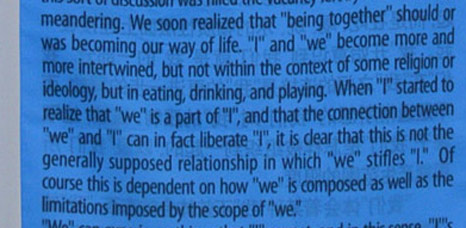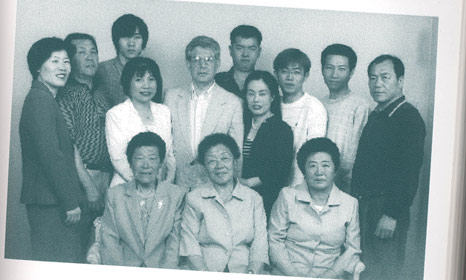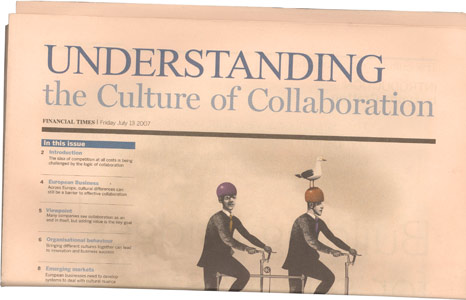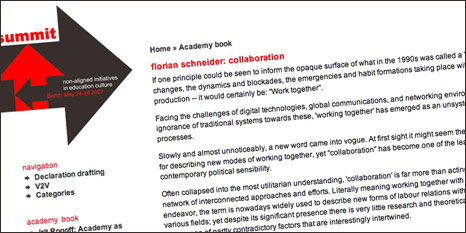hans ulrich obrist, cited in hal foster, Chat Rooms, 2004
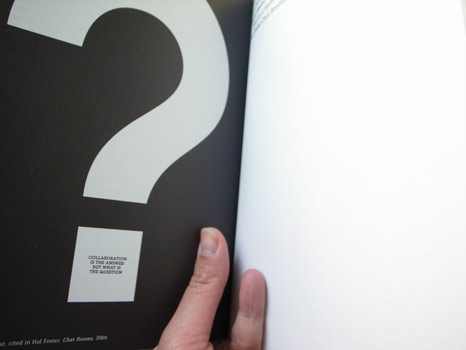
(collaboration is the answer but what is the question)
Posted by Y| Comments Off on hans ulrich obrist, cited in hal foster, Chat Rooms, 2004some links to collaborative practices Posted by Y| Comments Off on some links to collaborative practices
polit-sheer-form | 政治纯形式 Posted by Y| more »
“It Pains Me So: Notes on the Shahrzad Collective, 2006” Posted by Y| Comments Off on “It Pains Me So: Notes on the Shahrzad Collective, 2006”
Nicolas Bourriaud on the work of Philippe Parreno, Postproduction
“It is not by chance that Parreno has integrated the dimension of collaboration as a major axis of his work: the unconscious, according to Lacan, is neither individual nor collective; it exists in the middle, in the encounter, which is the beginning of all narrative. A subject, “Parreno &” (Joseph, Cattelan, Gillick, Höller, Huyghe, to name a few of his collaborations), is constructed through exhibitions that are often presented as relational models, in which the copresence of various protagonists is negotiated through the construction of a script or story.”
Posted by Y| Comments Off on Nicolas Bourriaud on the work of Philippe Parreno, Postproductionfinancial times (special insert) | friday, july 13, 2007 Posted by Y| Comments Off on financial times (special insert) | friday, july 13, 2007
“collaboration” by florian schneider Posted by Y| Comments Off on “collaboration” by florian schneider
Night School: Public Seminar 4 Contemporary Models of Agency A seminar with Maria Lind, Carey Young, Tirdad Zolghadr and others.
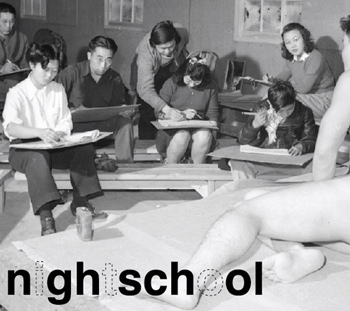
Benji Okuda instructing a life drawing class, an adult night school group at the Heart Mountain Relocation Center, Heart Mountain, Wyoming. Image courtesy of the National Archives, Records of the War Relocation Authority, 1941-1947.
![]()
New Museum | 235 Bowery,New York, NY 10002 | +1 212.219.1222
Thursday 24 April, 7:30 PM | Contemporary Models of Agency, part 1 – a lecture by Maria Lind
Friday 25 April, 7:30 PM | Contemporary Models of Agency, part 2 – a lecture by Tirdad Zolghadr
![]()
To speak of “agency” in the visual arts is currently the most polite way to raise the hairiest of questions, namely, does art have anything to do with a world beyond its own professional rituals and priorities, and, if so, could and should it strive to shape that world somehow. To raise the question of agency is to address matters of activism, realpolitik, the aesthetics of politics and the politics of aesthetics, but in a hope of discreetly dodging the dialectics of heroism and surrender, resistance and complicity that have plagued these things for so long. In our seminar, we wish to revisit these uncertain dialectics, to closely analyze the notion of agency in itself and to trace a number of models predominating today. But also to sketch out some key features of today’s context, including various forms of instrumentalisation, that determine our choices and possibilities.
What Are We Doing – Artistic Agency and the Collaborative Turn: The seminar will begin with Maria Lind’s discussion of collective activities throughout the art world. This is a new wave, following the one which helped shape conceptual art in the 60s and which was arguably crucial in the transition from modernism to postmodernism. For some this offers an alternative to the individualism that dominates the art world, for others a way of questioning both artistic identity and authorship through self-organisation. For others yet, it is a pragmatic choice, a possibility of shared resources, equipment and experience.
Thoughts on Turns Less Collaborative: The seminar will then move on to Tirdad Zolghadr’s examples of agency within the arts that are less tangible as such. From tactical retreats, to the growing influence of Italian operaismo, to unapologetic business entrepreneurship, to strategic essentialisms, what are the working premises of these methods of procedure, and which, if any, is their common ground by way of zeitgeist and ideological self-perception. On this count, the lecture will attempt to specify precarious or “post-fordist” working conditions which have been developing internationally over recent decades.
How does artistic agency play in with these developments? To what degree can the above strategies claim agency, and what kind of instrumentalisation is affecting this mode of cultural production? How can artistic agency be reformulated under the current neo-liberalised working conditions?
cooperation

